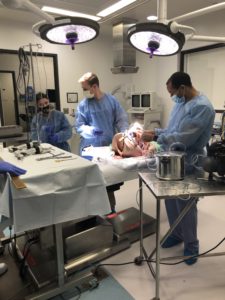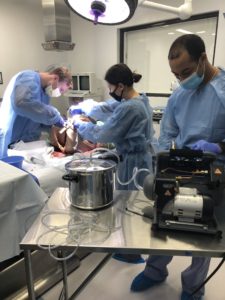There are approximately 292,000 cases of in-hospital cardiac arrest every year for which the survival rate is less than 24 percent. Resuscitative efforts and supporting technologies are ineffective, slow, fatiguing, traumatic and expensive.
As their Fall 2020 Capstone Project, a group of students from the Georgia Tech Schools of Biomedical, Electrical and Mechanical Engineering brought forth a minimally invasive treatment technology for cardiac arrest via access to the pericardium and subsequent delivery of internal compressions. The challenge was brought forth by an unmet clinical need in critical care via Dr. Alexander Prewitt, MD, an emergency care physician with Emory University Hospital.
![]()
 “The Incredibles” expanded on early testing in porcine hearts with cadaveric testing at GCMI’s preclinical facility T3 Labs. What they learned and what they demonstrated supported their selection as the winners of the Best Interdisciplinary Team of the Fall 2020 Georgia Tech Capstone Design Expo. More than 600 students participated in 117 projects.
“The Incredibles” expanded on early testing in porcine hearts with cadaveric testing at GCMI’s preclinical facility T3 Labs. What they learned and what they demonstrated supported their selection as the winners of the Best Interdisciplinary Team of the Fall 2020 Georgia Tech Capstone Design Expo. More than 600 students participated in 117 projects.
The device deploys a balloon-catheter system to deliver compressions directly to the heart during cardiac arrest, boosting blood flow to the brain.
From the Coulter Department of Biomedical Engineering’s spotlight on the team, “The Incredibles have roots going back to 2017 when [Caroline] Tanzy and [Caitlin] Nycum, when they were classmates in Problems in Biomedical Engineering. They ran into each other on campus about a year ago and decided they wanted to work with each other again, so Nycum got busy recruiting. She brought in [Devin] Jackson and [Logan] Coon, friends from her study abroad program, and Abbas, a classmate in the Coulter Department.”
“We needed more detail and more evidence on our technology’s potential beyond a porcine heart,” Jackson told us. “We liked what we saw from our early testing, but the access to a cadaveric testing opportunity and support with the GCMI and T3 Labs team was invaluable to our work. With their help, we proved the system can produce the pressure required while inflating at a rate that would not tear the pericardium.”
Prior to their cadaveric test, Tanzy was skeptical.
 “Our system has a lot of ‘moving parts’ that have to perform perfectly for the system to work as intended,” she said. “The balloon has to inflate without bursting and both the pump and regulator have to work properly, among other requirements. We were all thrilled to see water displace through the manometer with every compression cycle in our cadaveric testing.”
“Our system has a lot of ‘moving parts’ that have to perform perfectly for the system to work as intended,” she said. “The balloon has to inflate without bursting and both the pump and regulator have to work properly, among other requirements. We were all thrilled to see water displace through the manometer with every compression cycle in our cadaveric testing.”
“We have validated that the system works and both Devin and I may well make it part of our graduate studies,” Incredibles team member Coon told us. “Our work has opened my eyes to the potential for research in the field and the potential to translate my interest in electrical engineering into the medical field where our work may, one day, save lives.”
The team knows it now needs additional funding and resources like smaller, better catheters, better balloons, scaffolding, medical-grade pumps and more cadaveric verification testing to push its system forward.
“This, like many challenges, seemed daunting at first,” Jackson said. “If you put in the time and commit to your research you can accomplish a great deal more than you might believe.”
“Flexibility is key to success,” Tanzy adds. “Be prepared to pivot, don’t look back and always support your team.”
We congratulate The Incredibles for their remarkable work, their earned recognition and hope to be able to assist in the continued development of their promising technology.
GCMI’s mission is to bring new medical technologies to market that improve quality-based outcomes and delivery of care for patients worldwide. This certainly includes supporting development of medical technologies born in our backyard from faculty, researchers and students with whom we share our institutional affiliation. We congratulate the 2020 teams and eagerly anticipate what the 2021 teams have to show us later this year.
